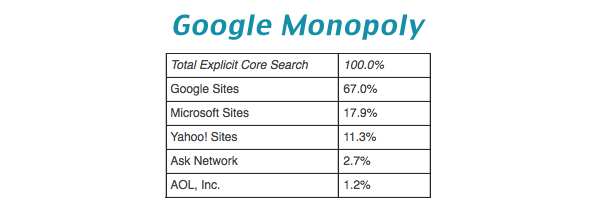When was the last time you “Yahooed” a restaurant? Howabout “Binging” someone to learn more about them? Maybe, never. Google’s search engine monopoly corners online advertising so that there is a lack of competition from other companies. Characterized by Google’s singular power to control where customers turn, their monopoly provides the ability to charge what they want, when they want to. The European Union agrees Google needs to stop hogging the market, and they issued a list of Google’s monopolistic practices following a two-year probe:
Google hogs specialized search – Google prominently displays links to its own specialized search services within its web search results and does not inform users of this favorable treatment.
Google hogs content usage – Google uses without consent content from competing specialized search services in its own offerings. Google thereby benefits from the investments of competitors, sometimes against their explicit will.
Google hogs with exclusivity agreements with publishers – Google requires web site owners to display no or only a limited amount of online search advertisements from Google’s competitors, which reduces the choice of online search advertisements they can offer to users of their web sites.
Google hogs by creating contractual restrictions on the portability of Google’s AdWords – Google contractually restricts the possibility to transfer online search advertising campaigns away
Bing accounts for 17.9 percent of search share in the US but they may be gaining ground on Google. Without irony, Microsoft’s CEO recently called on the US Government to break up Google’s monopoly on search engines. Nevermind their long battle with the federal government over their own past monopolies.
Governments won’t likely be successful in breaking up the mega-company that is Google, precisely because there is nobody doing as good as job. We Google because no service has proven better at search results. Nonetheless, calling a monopoly out doesn’t meant it should be broken up. In fact, the break up will occur through the natural shift in user preferences and methods for accessing search results. There will be new entrants coming into the market attempting to disrupt Google’s corner on advertising and searching. The introduction of mobile technology and new gaming systems, for example, demonstrate the move away from Google already. Bing is featured as the default search engine on the Xbox 360. Geographically Google is, arguably, a lost leader in Asian markets already. Understanding that Google does not monopolize all countries should be an indication of how other models are evolving market standards.


Someone do it better than Google and we’ll use it. Not that complex…
I wonder if the lack of command in other countries/cultures is a symptom of the data presentation being so “western”? Google seems to have mastered our cognitive paths. It is usually able to forecast my most trivial interests to a degree that makes me second guess the smug grins I give my more paranoid friends.